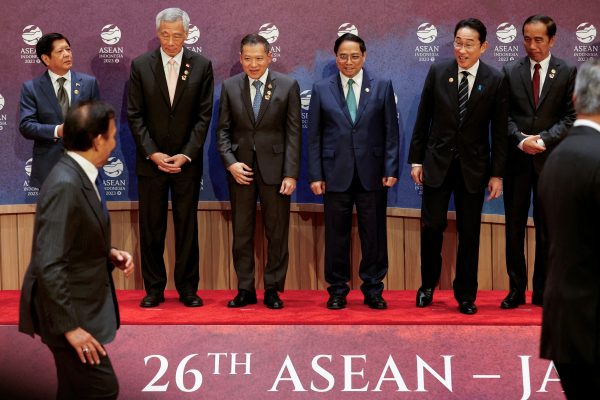Former Japanese prime minister Takeo Fukuda articulated Japan’s foreign policy shift towards the region in 1977 during a stopover in the Philippines. The Fukuda Doctrine would eventually become a cornerstone in Japan’s relationship with Southeast Asia, based on three important principles. They included a commitment by Japan to peace and its pacifist role, the development of people-to-people connections and cooperation for peace and prosperity.
The success of the Fukuda Doctrine can be measured in the tangible benefits from ASEAN–Japan cooperation today. Japan enjoys positive political and economic relations with every country in Southeast Asia and has bilateral economic partnership agreements with seven of Southeast Asia’s eleven countries.
It is a key trade and investment partner to ASEAN. In 2021 two-way trade between ASEAN and Japan reached US$240.2 billion, making Japan ASEAN’s third largest trading partner. In the same year, among ASEAN’s dialogue partners, Japan was also ASEAN’s fourth largest source of foreign direct investment with inflows from Japan, amounting to US$12 billion.
From 1998 to 2018, the number of Japanese companies in ASEAN expanded 35-fold in key manufacturing sectors, creating jobs and training opportunities across Southeast Asia.
Japan is also the largest provider of official development assistance (ODA) to the ASEAN countries with a total of US$129 billion to date.
Over the years, Japan has supported ASEAN’s development and integration through a range of initiatives including assistance during the Asian financial crisis, through disaster relief following the Indian Ocean tsunami and via the establishment of the Japan–ASEAN Integration Fund. During the COVID-19 pandemic, Japan committed US$50 million to the development of the ASEAN Centre for Public Health Emergencies and Emerging Diseases.
Japan’s soft diplomacy in Southeast Asia has paid off. According to the recent State of Southeast Asia 2023 Survey Japan is viewed by nearly 55 per cent of Southeast Asian opinion leaders as the most trusted major power in the region. At a time of rising geopolitical tensions, where multilateralism and the rules-based order are under threat, Japan’s longstanding commitment to the region has reinforced views of Japan as a reliable partner in ASEAN. Japan is also one of the region’s top three choices as a strategic partner if third parties are required to hedge against the uncertainties of US–China rivalry.
Russia’s invasion of Ukraine was a devastating blow to international law. Japan was one of the first countries to condemn it. But most ASEAN countries did not. Singapore condemned Russia’s actions, but the majority of Southeast Asian governments refused to name Russia as the aggressor.
Since the invasion, Japan has been quietly reviewing its foreign policy and defence posture. This includes the adoption of three key national security documents in 2022, an increase in its military spending and a revision of its ODA Charter to respond to the emergence of the new balance of power in the region.
Japan has also doubled down on its engagement with ASEAN, being among the first to express support for the ASEAN Outlook on the Indo-Pacific, which shares some principles with Japan’s own Free and Open Indo-Pacific. The ASEAN–Japan partnership will be upgraded to a ‘Comprehensive Strategic Partnership’ in December 2023.
Analysts talk about the end of the United States’ unipolar moment and the emergence of a multipolar world. As the US security umbrella shrinks, Japan will be increasingly looked upon as a reliable partner. Japan’s nuanced approach to regional order is appreciated by ASEAN, particularly its balance between Beijing and Washington and its shared goal of strengthening the international rules-based order. While there had been lingering fears of Japanese militarisation in the past, a strengthening of Japan’s security role might not be unwelcome.
The prevailing narrative in Asia is against any unilateral changes to the status quo by force. As the US –China rivalry heats up, potential geopolitical flashpoints pose conflict risks. China’s sweeping claims over the South China Sea, intrusive actions into the exclusive economic zones of a number of ASEAN member states and rejection of the 2016 Arbitral Tribunal ruling worry the region.
Circumstances over the past 50 years created an environment conducive for Japan and ASEAN to pursue development and prosperity. A change in the status quo on the Taiwan Strait or any conflict over the South China Sea would threaten these joint goals. Middle powers like Japan and groupings like ASEAN are trapped in this geopolitical flux and cannot afford to stand idly by.
To protect against geopolitical shocks, ASEAN and Japan can buttress the rules-based order and strengthen the international rule of law. The inaugural meeting of ASEAN’s and Japan’s justice ministers followed by a meeting of ASEAN and G7 ministers were a start. Both meetings reaffirmed the importance of the rule of law and established a mechanism for communication between key ASEAN and G7 judicial officers.
Building more robust frameworks that reinforce the rule of international law in East Asia is a challenge for the future of ASEAN’s relationship with Japan.
Sharon Seah is Senior Fellow and Coordinator at the ASEAN Studies Centre and the Climate Change in Southeast Asia Programme, ISEAS–Yusof Ishak Institute, Singapore.

